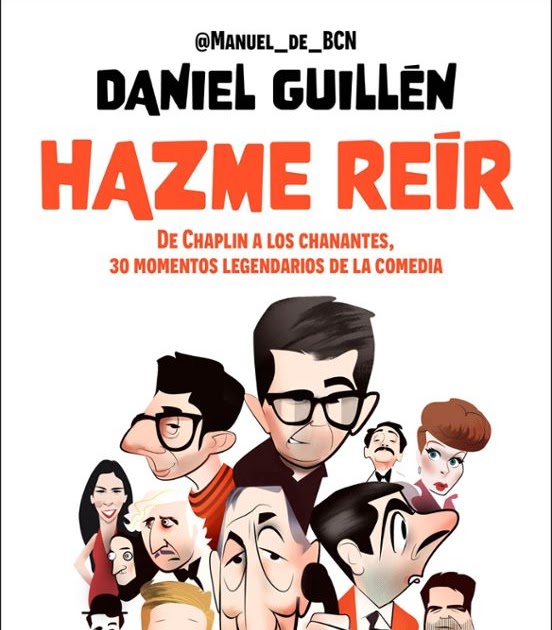
Language: español
Year of publication: 2024
Valoración: advisable
A curious phenomenon that has occurred in recent years is that of writers who have managed to publish thanks to their previous work on social networks; Understand that I am not talking about the typical influencers, undocumented youtubers or poeticos of institute folders, but of people who know a lot about some subject -or investigate and then know how Bluesky Some of these disseminators (I refuse to call them “content creators”) have then published books that collect all those threads, from the what A few chosen, so far, have deserved the immortality of the reviews of a book a day, as has happened with those written by Pedro Torrijos and Laia San José. In the case that we are concerned, we have another of these disseminators in networks, Daniel Guillén Hidalgo -known on the Internet as @manuel_ of BCN -that is not dedicated to telling us stories about architecture or Vikings, but of something that is usually of the general or that, at least, we all ever enjoy, according to the tastes of each one, and can even become addictive: the comedy.
But not any type of comedy; We do not talk about the comedy of Dell’Arte or the bourgeois vaudeviles that are usually represented in the theaters during the patron saint parties of each city … In the case of this book, the many chapters are divided between those dedicated to:
a) television series or “situation comedies” (sit-coms) more or less mythical: Fawling Towers -Where the author took out his pseudonym in networks, because one of the characters always presented himself as “Manuel, from Barcelona”-, QIriero, Lucy, Seinfeld, Crazy for you o Gold girls …
b) Humor films: among which great hits appear (if not already mythical films) as One night at the opera, The young Frankenstein, The national shotgun, Brian’s life, Lands as you can, when Harry found Sally o Modern timesby Chaplin -in a chapter in which he also tells us about two other colossi of the time: Harold Lloyd and Buster Keaton; As in the series of the previous section, the chapters focus, above all, on the genesis, sometimes difficult, of these great and hilarious titles 8 a memory from here to Beatle George Harrison, which mortgaged his mansion to be able to finance and, above all, see Brian’s lifein what has been called “the most expensive cinema entry in history”).
c) most of the book is dedicated to comedians who, although they have been able to succeed later in the cinema and/or television, began or at least frequently cultivated during some time of their life what is known as stand up comedythat is, they have been monologuists or, even if, counting … the list is very wide and in it we find from movie stars -that is, they dedicated themselves to the movies later, but they started on the stages -such as Steve Martin, Woody Allen, Robin Williams, Bill Murray, Richard Pryor, Jim Carrey … (these first names perhaps surprise the non -American ones) Others who did not make the leap to the big screen, but whose names are legendary for professionals and humor fans, such as George Carlin or Lenny Bruce; Epitomes of a certain British humor -Aparte de los (Monty Python, of course), such as Peter Sellers, Rowan Atkinson and Ricky Gervais and even Hispanic representatives of the genre: the Great Gila, Andreu Buenafuente or, at this point and mythical Eugenio. In this category we can also include theatrical groups that, even if they do not do exactly monologues -of fact, there are some who do not even speak -have triumphed in the stages of where they have passed: I mean tricicle and the no less great Les Luthiers.
As seen, with the exception of the latter, Argentines, the rest of the comedians of which Daniel Guillén tells us in the book – there is any more, but the same thing happens – they are either in the Spanish cultural field or of Anglophones countries. There are no more representatives of Latin American humor or, for example, French or Italian humor. It is understandable, since the many of the characters and works that the book is about appears in it due to the memory or the vital and cultural trajectory of the author and, in addition, the available literature on scenic humorists seems to be especially in English, but, in any case, it would be desirable that in some future new volume the comic would be included from other languages or cultures. Also, although a few already appear here, such as the aforementioned Lucille Ball or Carole Burnett, more space could be dedicated to humorist women, some of them excellent (and particularly in the monologue field, I think). The same can be desired about the inclusion of humorists arising not in comedy clubs, theaters or on TV, but in the different channels that the Internet provides today (such as the author of the book itself).
Points these, in any case, very secondary to the great virtue of the book, which is to make us have a good time and, above all, to make us want to have much better knowing or reviewing, the entire humor plethora that proposes us.
Source: https://unlibroaldia.blogspot.com/2025/06/daniel-guillen-manueldebcn-hazme-reir.html


